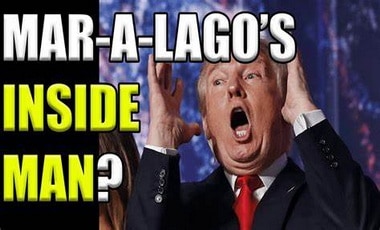THE FULL interview can be found here: “An FBI Agent Blows The Cover Off The Mar a Lago Raid (Ep. 1829) – The Dan Bongino Show“.
Confidential Human Source (CHS) was probably invoked to ensure the affidavit could be as simple as the Secret Service fulfilling a request by the FBI to change the lock. This person tasked with that job could then be said to be a CHS.
A new article by THE FEDERALIST goes an extra step to show this was vindictive in nature:
…..“All physical documents and records constituting evidence, contraband, fruits of crime, or other items illegally possessed in violation” of federal statutes governing records possession, the warrant reads, were to be seized. Records extended to “Any government and/or Presidential Records created between January 20, 2017, and January 20, 2021.”
In other words, had Trump written something down on a napkin, federal officials were authorized to raid the former president’s home and capture it.
The affidavit allegedly asserting probable cause has not been made available to the public by the DOJ or the federal court that sealed it.…..
And an important article by NATIONAL REVIEW speaking to just how much the warrant allowed to be taken:
…..From there, Attachment B seems to prioritize classified-information crimes, but less so than appears at first blush. Subsection (a) authorizes agents to seize documents marked classified, but the license is much broader — the warrant allows seizure of not only containers in which classified documents are found (along with their other contents, even if they are not classified), but also of other containers found proximate to those first containers, again, regardless of whether the contents are classified. So, for example, if agents found one low-level classified document in a container that was stored next to ten other containers of nonclassified documents, the warrant permitted seizure of all of the nonclassified containers and their nonclassified contents.
Then there’s subsection (b), which permits the seizure of communications, in any form, regarding classified information. Note: The communications do not have to be classified to be seized; they can be nonclassified and about anything as long as they have some connection to classified information.
Where things get really, shall we say, elastic is subsection (c). It permits the seizure of “any government and/or Presidential Records created” throughout the four years of Trump’s presidency.
Plainly, this has nothing to do with classified information. It is mainly designed to use the criminal law — the search warrant, an intrusive tactic for retrieving evidence of crimes — to enforce the Presidential Records Act, which is not a criminal statute.
Can DOJ get away with this? Perhaps. Section 2071 is very broad, targeting anyone who “removes” or “destroys” “any” government record. If you are wondering how this did not apply to Hillary Clinton’s removal of tens of thousands of government-related emails and willful destruction of tens of thousands of others, you are not alone. In any event, Rule 41 of the Federal Rules of Criminal Procedure permits the seizure not only of evidence of a crime but also of “items illegally possessed.” It seems clear from the context that this phrase is meant to apply to items derived from criminal activity. Literally, though, it is clearly broader than that.
Since Congress did not choose to attach criminal penalties to violations of the Presidential Records Act, what we see here amounts to the Justice Department fashioning a new crime for Donald Trump. This is not my idea of the even-handed enforcement of the law — no partisan discrimination — that Attorney General Merrick Garland insisted he pursues in his remarks on Thursday. But there will be plenty of time to discuss that.
My point for present purposes is that subsection (c) authorized the FBI agents to seize every scrap of paper from the Trump administration. There is no limitation to classified information. There is no limitation to the Presidential Records Act. There is no limitation to the unmentioned Capitol riot. Indeed, there is no requirement that any scrap of paper be connected in any way to any crime whatsoever. No restriction at all. If it was arguably a government record of any kind generated during the Trump presidency, the judge said the bureau could take it.
The FBI and Justice Department will be doing what I told you they’d be doing: Poring over everything and anything from Trump’s presidency to try to make a January 6 case. …..
